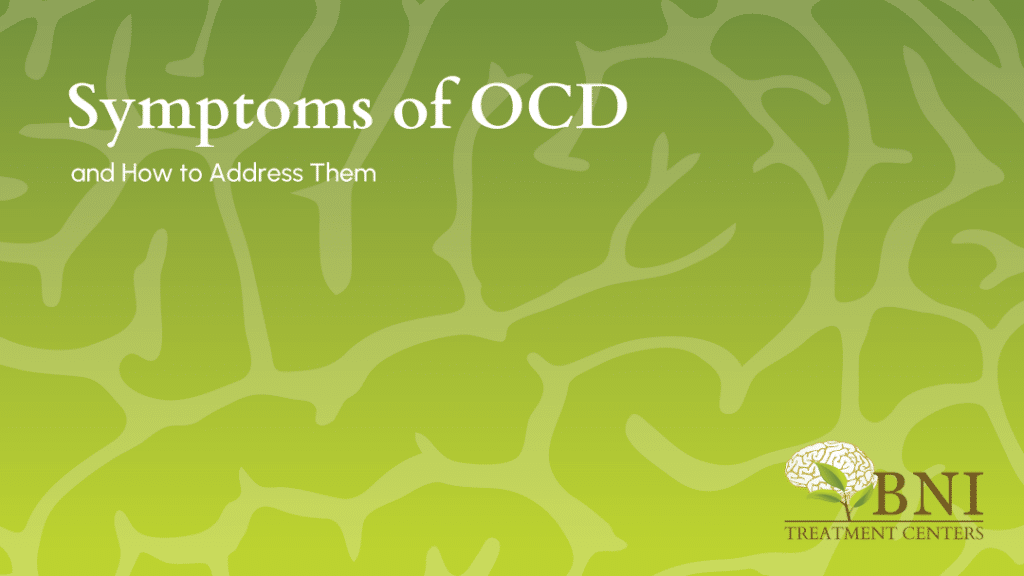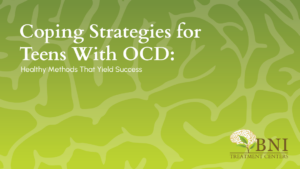
“Oh, you know her. She’s so OCD sometimes.”
This phrase is often used to describe someone who is overly organized, or worried about cleanliness. Yet, the colloquial phrase hides a stark reality. OCD, or obsessive-compulsive disorder, is a serious mental health condition that can be debilitating. And unfortunately, as many as 50% of people who have OCD receive no treatment, in large part due to a lack of education and awareness of this disorder. Teens in particular are vulnerable, with symptoms most often appearing in late childhood and adolescence.
So today, at BNI Treatment Centers, we want to cover the symptoms of OCD. Our goal is to empower you to recognize these symptoms within your own teen, so you are able to evaluate whether it’s time to involve a mental health professional for a full diagnosis.

Understanding OCD Symptoms and Their Severity
OCD is a complex mental health condition. Once viewed as an anxiety disorder due to the intense negative emotions that can occur, its symptoms are closely linked to one another.
Obsessive and Compulsive Symptoms
These symptoms can appear as intrusive thoughts, images, or urges. These are often accompanied by feelings of anxiety, distress, and a desire to make the thoughts or urges go away. Many teens who experience OCD will act out in an attempt to distract from their thoughts, or to answer the underlying anxiety, leading to compulsive behavior.
These behaviors and thoughts typically cause problems in your teen’s daily life, either emotionally or by taking up their time. Your teen may even recognize that these behaviors are unreasonable, and be unable to stop themselves. This can present itself as compulsions, such as excessive hand-washing, checking of locks or appliances, and repeated counting. It can also manifest as obsessions, such as fear of germs, worries about people being hurt, or a desire for symmetry and order.
OCD vs. OCPD
When a teen starts experiencing symptoms of OCD, many parents looking for answers find a similar term known as OCPD, or obsessive-compulsive personality disorder. However, while they share similar names, in reality they are fundamentally different.
With OCPD, critically there are no obsessions or compulsions. Certain behaviors may be shared, such as a drive for perfectionism or cleanliness, but these are not related to underlying intrusive thoughts or anxiety. Instead, with OCPD, these behaviors are a facet of the person’s personality, often based in a desire for control.
How Is Obsessive-Compulsive Disorder Diagnosed?
Unfortunately, there is no simple test for OCD, and no one-size-fits-all approach to treatment. It takes a trained medical professional who works with your teen to understand their specific situation and symptoms. In general, they consider the following criteria:
- Does your teen experience obsessions, compulsions, or both?
- Does your teen try to ignore or suppress these obsessions? This can manifest as compulsive behavior, attempting to distract from obsessive thoughts with actions.
- Do these obsessions or compulsions interfere with their life, take up a significant amount of their time, or lead to anxiety and emotional dysfunction?
However, clinical psychiatrists and mental health professionals will adjust for other factors as well, taking an in-depth and comprehensive approach. They’ll answer questions such as, are there potentially other mental health disorders involved? Or could these symptoms be explained by other conditions, such as lifestyle or social environment?
If your adolescent is experiencing symptoms of OCD, it’s important to seek a psychiatric evaluation – to get both an accurate diagnosis and effective treatment.

Getting Treatment for OCD
When your teen is living with OCD, many parents feel powerless to help, like they have nowhere to turn. Their child should be thinking about school, or hanging out with friends, and instead are left grappling with the anxiety, stress, and symptoms of OCD. But know that treatment is always possible, and your teen doesn’t have to go through this alone. Trained psychiatrists who specialize in OCD treatment for teens are available, who can help your teen get control of this disorder.
At BNI Treatment Centers, we are laser-focused on adolescent mental health. Our industry-leading psychiatrists have extensive experience helping teens like yours navigate the challenges of obsessive-compulsive disorder. We take a holistic and evidence-based approach to care, helping your child not only get control over their OCD, but to develop the skills they will need for the rest of their life. Reach out to us at (888) 522-1504 to get your teen the treatment they need today.
BNI Treatment Centers: Science-based, evidence-backed, compassion-led.
FAQs About Symptoms of OCD
Q: When do OCD symptoms usually first appear?
A: While OCD symptoms can appear at any point in life, they most often develop during late adolescence. Symptoms are less likely to develop during childhood or adulthood, but can present as early as 8 years of age, or as late as sixty.
Q: What does an OCD episode look like?
A: These episodes are periods where OCD symptoms and compulsions are much more intense, difficult to resist, and come with increased anxiety. While no two people’s experiences will be identical, these episodes can be highly disruptive.
Q: What are the social symptoms of OCD?
A: While OCD is not an anxiety disorder directly, the related feelings and stress can have significant social impacts. Teens may avoid social settings which trigger their compulsions, or may experience social anxiety about how they will be judged for their OCD.



